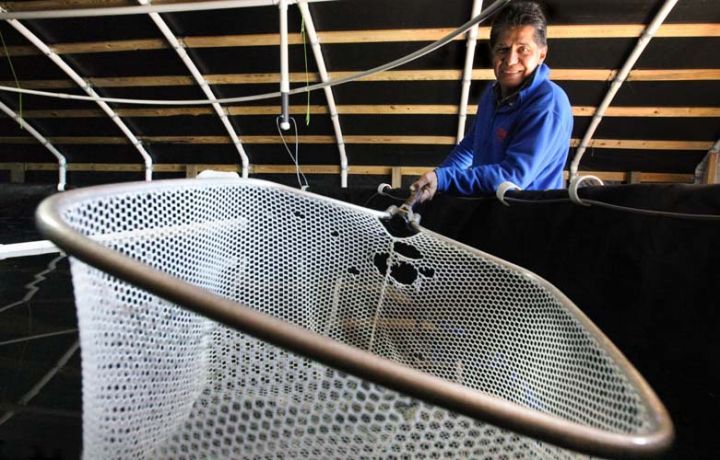
VERO BEACH — East of A1A on the southeastern border of Indian River Shores is a little-known nursery. Not filled with toddlers or plants, but shrimp. On this site by the sea, Florida Institute of Technology rents land to Florida Organic Aquaculture, which is based in Jupiter and describes itself as “a world leader in seafood science.”
Behind the 7-Eleven and CVS on this institute property, aquaculture manager Jose Manzo goes about the business of raising shrimp for commercial consumption, and has gotten rave reviews from chefs of several barrier island restaurants.
Manzo is experimenting with environmental factors and genetics to get the largest, tastiest organic shrimp possible.
His jumbo shrimp with heads on cost $8 a pound – unlike wild jumbo shrimp which cost between $15 and $17 a pound with heads off.
“We’re in the early stages, but it looks very promising,” he said.
“The shrimp are outstanding,” said Moorings Club chef Ben Tench. “Unusually large and flavorful.”
“Very good because of the size, texture and taste,” said Coco’s Village Bistro manager Tiffany Reeder.
“As soon as they clean and de-vein them as part of the process, we’ll buy them in a heartbeat,” said Citrus Grillhouse chef Scott Varracchio.
He said he had tried the shrimp and thought they were good, but added that he needs them cleaned and ready to cook, upon purchase.
“As we progress, we’ll complete our farm in Fellsmere and have a packing plant for processing,” said Manzo, a UF agronomy graduate who spent a decade managing shrimp farms in Ecuador then working with shrimp farm pioneer Jim Norris.
“Shrimp have been my life for 30 years.”
At the Fellsmere site, where construction on 100 acres is expected to be completed by July, there initially will be 20 tanks which will expand to 40 by year’s end.
“With the 20 tanks, we anticipate we will get a million pounds of shrimp between July and November,” said Manzo.
The process used by Manzo and his crew at the FIT Marine Lab is called biofloc technology and involves ramped-up aeration of fresh sea water in lined tanks, where the shrimp are fed grain and molasses pellets.
The aeration process, which is called “a zero-exchange circulating water system” converts toxins so that the water remains clean without the use of chemicals.
“This makes the flavor more natural,” said Manzo.
On a recent chilly afternoon, he checked out a water sample under a microscope to make sure it was free of bacteria and debris.
“We get 12 shrimp to the pound, which is quite a good size, and production is better than expected with 1,700 pounds of shrimp produced in 160 days,” he said. That amount should increase dramatically by next year.
Numerous scientific studies show that the numbers of jumbo shrimp available in the wild are declining.
Shrimp are happiest, Manzo explained, in warm water – about 80 degrees – with lots of oxygen and about 14 hours of darkness and 11 hours of light. They like clean, salt water.
“These shrimp maintain their fresh, natural flavor for 36 hours after thawing,” said Manzo. “We look forward to a growing market.”



